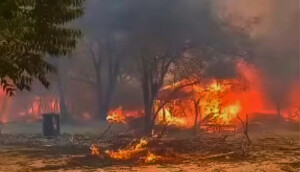‘Sudan should implement democratic reforms’: UN Human Rights Expert
During his fourth visit to Sudan, the UN Independent Expert on the Situation of Human Rights in Sudan, Aristide Nononsi, witnessed positive developments, yet he remains concerned about a number of human rights issues in the country.
Concluding his 11-day mission to Sudan today, Nononsi expressed his gratitude to the Government of Sudan for its cooperation during the visit. “The Government granted me access to all places, persons, and institutions that I requested access to,” he told reporters in Khartoum.
During his fourth visit to Sudan, the UN Independent Expert on the Situation of Human Rights in Sudan, Aristide Nononsi, witnessed positive developments, yet he remains concerned about a number of human rights issues in the country.
Concluding his 11-day mission to Sudan today, Nononsi expressed his gratitude to the Government of Sudan for its cooperation during the visit. “The Government granted me access to all places, persons, and institutions that I requested access to,” he told reporters in Khartoum.
“I visited Khartoum and Blue Nile where I met with a wide variety of stakeholders, including the Minister of Foreign Affairs, the Minister of Minerals and Secretary of the National Dialogue, the Under Secretary for the Ministry of Justice as well as specialized government units and agencies, the Legislative Committee of the National Assembly, the Attorney General, the Judiciary, the Sudan National Human Rights Commission, community leaders, academia, representatives of civil society, representatives of internally displaces persons, UN entities and the diplomatic community in Khartoum.
Positive developments
“The purpose of these meetings and field visits was to follow up on issues of concern that I identified during my mission in February 2017, and discuss the status of implementation of the recommendations contained in my report of September 2016 to the Human Rights Council,” Nononsi said.
“Since my last visit in February 2017, I have noted some positive developments. In this regard, I welcome the decision of the President of Sudan of 8 March to pardon 259 armed movement personnel who were captured during fighting with government forces in Darfur. This number included 66 fighters who had been sentenced to death. In addition, on 11 May, two pastors [!] who were sentenced to 12 years imprisonment were released from custody after a presidential pardon.
“I would also like to commend the Government for the efforts undertaken in order to facilitate access for delivery of humanitarian assistance to the conflict affected areas in Darfur, South Kordofan and Blue Nile. These are welcome measures which I hope will help improve the political and social environment in the country.”
Regarding to the appointment of the chairman of the Sudan National Human Rights Commission on 16 May, the UN human rights expert referred to “the important role that can be played by an independent national human rights institution”, and encouraged the Sudanese authorities “to fill the remaining vacant positions for the commissioners in a transparent and representative manner”.
Concerns
Among the human rights issues in the country that are still largely unaddressed, Nononsi mentioned the detention of Dr Mudawi Ibrahim and Hafiz Idris, “as I believe that they are being held solely for their legitimate work on protecting and promoting human rights in Sudan”.
He further encourages the Sudanese government “to consider amendments to the Sudan Voluntary and Humanitarian Works Act of 2006, to bring it in line with the Interim National Constitution and international human rights standards. More specifically, I would urge the Sudanese authorities to consider abrogating all provisions in this law which negatively impact the work of civil society organizations, including Articles 7 to 14 of this Act.”
Other areas of concern he discussed “with the relevant stakeholders” is the protection of the freedom of religion, “with particular reference to the demolition of churches and places of worship by the national security service”, and the “ongoing censorship of newspapers”, and increased restrictions on journalists from freely expressing their opinion.
As for the powers of the National Intelligence and Security Service, the UN expert noted that they should be brought “in line with international standards – a governmental body operating as an intelligence agency focused on information gathering, analysis and advice to the Government”.
Regarding the situation in Darfur, Nononsi called on the Sudanese government “to focus on the implementation of provisions of the Doha Document for Peace in Darfur (DDPD) relating to disarmament and disbanding militias so that the protection concerns in the region may be addressed”.
‘Democratic reforms’
The Sudanese government further should take key steps such as “the establishment of an appropriate legal framework, institutional arrangements, and democratic reforms”.
Nononsi stated in this context that “Some partners are already providing support to strengthen the capacity of the formal justice system (courts, judges, prosecutors, police, and corrections) in order to promote accountability for violations of international human rights and humanitarian laws and effectively combat impunity.
“In this regard, I call on the international community to continue and increase its assistance to the Government of the Sudan, including by funding the joint rule of law and human rights programme for Darfur.
“I also call on the Government to facilitate the deployment to the Sudan of the technical assessment mission of the Office of the High Commissioner for Human Rights in order to discuss potential areas for possible technical cooperation with the relevant Sudanese authorities and other stakeholders, including UN entities, civil society organisations, and the diplomatic community.”
In conclusion, the UN expert urged Khartoum” to continue its efforts to address the challenges identified above. These challenges form the basis for identifying the relevant areas for technical assistance and capacity building necessary to improve the human rights situation in the country”.











 and then
and then